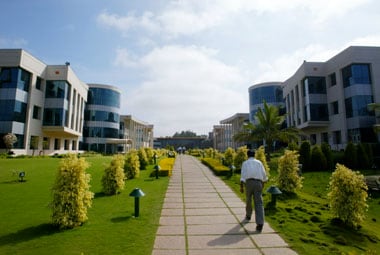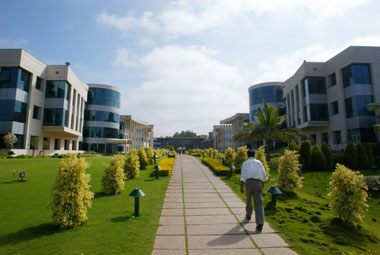Will the market’s weak perceptions about Infosys change if it makes a large acquisition? In recent months, thanks to poor revenue guidance and a growing pile of cash reserves, analysts have called for either a big acquisition or a return of cash to investors.
With cash or cash equivalents of $4 billion-and growing-Infosys Chairman KV Kamath apparently believes that a high profile acquisition will help, according to a report in The Times of India. Kamath apparently wants an acquisition of at least $1 billion to silence critics.
Infosys’ management has received flak for being too timid, slow growth and a case involving alleged visa fraud in the US. Most believe that these problems are largely internal. But by far the biggest sore point with investors is the company’s inability to grow inorganically.
[caption id=“attachment_355847” align=“alignleft” width=“380” caption=“Infosys’ management has received flak for being too timid, slow growth and a case involving alleged visa fraud in the US. Reuters”]
 [/caption]
[/caption]
According to a report in Deccan Herald, the company is looking at acquiring intellectual property-based companies which will add to non-linear growth. However, the company has been obsessed about paying too much for acquisitions.
An analyst tracking the company said that there are a lot of good companies out there that could be acquired but Infosys must be willing to pay the right amount for them. “It is highly unlikely that they will acquire a company because they are conservative when it comes to price and valuations,” the analyst noted.
Impact Shorts
More Shorts“Historically, Infosys has been choosy about acquisitions. They are compromising on growth and sitting on liquid assets,” says Sudin Apte CEO of Offshore Insights, a Pune-based IT research company. Much to investors’ disappointment, the company has also been tightfisted about payouts. For 2011-12, the company announced a dividend of just Rs 47 per share for the full year.
However, other analysts flag other concerns about the company, including the high-profile exits of some of the top executives starting from Nandan Nilekani, Mohandas Pai, and recently, the head of Infosys’ BPO arm Rohit Idnani. “With the top 2-3 layers of the leadership gone, Infosys’ opportunity creation has gone down. Nandan’s persona opened new doors,” said Apte. Apte’s view is that exits of client-facing people, which is critical for a company in this business, has cost Infosys a lot.
The trend started with Phaneesh Murthy’s exit after a sexual harassment case in 2002, followed by Nandan’s exit and last year’s resignation of Mohandas Pai, who headed HR, and Subhash Dhar, who steered global sales.
“The company has lost some thought leadership and decision-making which is has an impact on the morale of the entire workforce,” said Apte.
While Infosys’ peers were busy building an efficient backend system and infrastructure at home with the help of a talented workforce, Infosys got its client-facing abilities right over the last decade. “It had a clear lead in client relationships, sales and marketing. When it wasn’t so crucial, they got it right. But in the past two years, when it mattered the most, unfortunately the company has lost the edge,” said Apte.
Analysts worry that rival Cognizant is inching very close to oust Infosys as the second-largest IT company after TCS. “In the lower value segment like BPO, Infosys is not performing too well. Maybe it’s a conscious decision that they have taken but if it continues to be this way, Cognizant will soon take its place,” said another analyst with a prominent financial services company.
But the industry is not yet ready to give up on India Inc’s former posterboy. They believe that once its missing pieces are fixed, and strategies are put in place, it will be back up again to run the show.
)